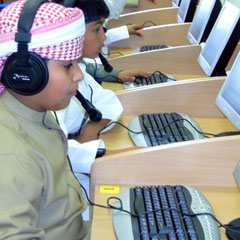Search Powered by Google

One of the Telecommunication Regulation Authority (TRA) responsibilities is to work on the development and upgrading of the telecommunication system in the State through training, qualifying, establishing relevant educational institutions and attaining the latest releases of the apparatus, equipment and facilities in the telecommunications technology.
School's Access to ICTs (Stage 3/Stage 4)
The UAE Ministry of Education is constantly enhancing its educational strategy to ensure that the programs developed in its schools comply with international standards, with particular focus on introducing the latest IT resources at all levels. For example, one of the goals is to provide a computer for every ten children in kindergarten, every five pupils in primary schools, every two students in preparatory schools and one computer per student in universities.
The UAE Ministry of Education has created a single educational portal for both elementary and secondary school students in both public and private school. The portal titled Moeya has a variety of news and information for school age children and links into many other resources available to children through their schools or other government entities. Most of UAE schools have a local area network linking all the classrooms/offices/library together, in addition, to those schools that have Internet access; a portal website for each school is created. Some private schools incorporate Internet/intranet wireless access.
Broadband and Internet access is available for public and private schools in the UAE. Broadband for Schools is part of Etisalat’s social responsibility initiative, aimed at promoting the use of information technology across the UAE and offered at a discounted cost starting from $130/mo leased line.
Enhancing Education with ICTs (Stage3/Stage 4)
The UAE has important initiatives for computer training it is implementing in the public school system and some private schools. The first is the International Computer Driving License (ICDL). The ICDL is an international standard for computer literacy adopted in over 140 countries. In 2005 120 teachers and supervisors had participated in the program, by 2008 all facilities under the Abu Dhabi Education Zone will be required to have completed the ICDL certification.
Al Mawakeb School in Dubai has implemented an initiative involving technology and digital integration that is the first of its kind in the United Arab Emirates (UAE) and the world. The classrooms have been transformed into wireless and multimedia learning centers. In addition, the school aiming to replace chalk boards with interactive boards, and school textbooks with eBooks accessed from notebook PCs provided to each student.
In general, most of schools in UAE have access to the Internet allowing teachers to access class related materials and to provide more resources to the school and students.
Developing the ICT Workforce (Stage 4)
The UAE has made a great progress toward executive training in IT and related fields in the past few years through a number of e-learning initiatives. One such initiative is Knowledge Village (KV). Knowledge Village is an ambitious initiative aimed at building a vibrant connected learning community that will develop the region’s knowledge workforce and catalyze new economic growth and development.
One of the first virtual universities and KV based project in the UAE is Dubai Police’s E-TQM College that was launched in October (2002). The E-TQM College will provide total quality management courses online to professionals in both private and government sectors (http://www.escwa.org.lb/wsis/reports/docs/UAE-E.pdf).
Another KV project is the agreement announced September (2002) between Purdue University and Village, and which calls for Purdue to offer its top-ranked International Executive MBA program to the Gulf region from Knowledge Village.
Another initiative was undertaken in June 2002, when Dubai Internet City (DIC) announced its joint with eCollege from the United States to form "Knowledge Access". Knowledge Access company is located in DIC and will provide technology and support services for academic institutions and corporate training organizations to build full online programs (http://www.escwa.org.lb/wsis/reports/docs/UAE-E.pdf).
Participation in Higher Education by UAE nationals is considered to be among the highest in the world with a rate of 95% of females and 80% of males continuing from High School into secondary education. In 2004, the number of students in higher education was 85,200. Of this number 13% were enrolled in programs in the ICT fields (http://www.american.edu/carmel/jp2450a/8.htm).
Etisalat Academy
Etisalat, the large national Telecom Company also has established an academy which serves as a corporate training institution not only for Etisalat employees, but many other high tech companies in the region as well. (http://www.eacademy.ae) "The academy is considered to be an exclusive regional representative for many international vocational and profession authorities from the USA and Europe." The academy is the first school in the Middle East established to test, certify and approve "IT Security" engineers and experts with the International American Authority for Information Technology Security. (http://www.american.edu/carmel/jp2450a/8.htm)
ITEP Project
To support the countries human capital development in ICT, the IT Education Project (ITEP) project was created. In year 2000, the ITEP is part of a government lead strategy to create the UAE Knowledge Economy. The program provides course in 40 high schools in the UAE (20 in Dubai, and 20 in Abu Dhabi) and over 13,000 students pass through the program every year. Providing a high quality, industry-relevant IT education, ITEP complements the Ministry of Education’s aim of introducing new means of teaching. The IT academies in Dubai and Abu Dhabi are the vital administrative heart of the project. These academies are responsible for teacher training and courseware development, Internet-based anytime, anywhere, adaptive learning, project management and quality assurance for all ITEP initiatives.
Overall, UAE has many opportunities for the continued education of the ICT workforce whether through the universities or at specialized colleges of technology.

